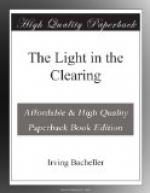“Do ye hear the little silver bells in yon tower?” he asked.
As we listened a moment he whispered: “It’s the song o’ the Hermit Thrush. I wonder, now, whom he imitates. I think the first one o’ them must ‘a’ come on Christmas night an’ heard the angels sing an’ remembered a little o’ it so he could give it to his children an’ keep it in the world.”
I looked up into the man’s face and liked him, and after that I looked forward to the time when I should know him and his home.
Shep was rubbing his neck fondly on the schoolmaster’s boot.
“That dog couldn’t think more o’ me if I were a bone,” he said as he went away.
END OF BOOK ONE
BOOK TWO
Which is the Story of the Principal Witness
CHAPTER IX
IN WHICH I MEET OTHER GREAT MEN
It was a sunny day in late September on which Aunt Deel and Uncle Peabody took me and my little pine chest with all my treasures in it to the village where I was to go to school and live with the family of Mr. Michael Hacket, the schoolmaster. I was proud of the chest, now equipped with iron hinges and a hasp and staple. Aunt Deel had worked hard to get me ready, sitting late at her loom to weave cloth for my new suit, which a traveling tailor had fitted and made for me. I remember that the breeches were of tow and that they scratched my legs and made me very uncomfortable, but I did not complain. My uncle used to say that nobody with tow breeches on him could ride a horse without being thrown—they pricked so.
The suit which I had grown into—“the Potsdam clothes,” we called them often, but more often “the boughten clothes”—had been grown out of and left behind in a way of speaking. I had an extra good-looking pair of cowhide boots, as we all agreed, which John Wells, the cobbler, had made for me. True, I had my doubts about them, but we could afford no better.
When the chest was about full, I remember that my aunt brought something wrapped in a sheet of the St. Lawrence Republican and put it into my hands.
“There are two dozen cookies an’ some dried meat,” said she. “Ayes, I thought mebbe you’d like ’em—if you was hungry some time between meals. Wait a minute.”
She went to her room and Uncle Peabody and I waited before we shut the hasp with a wooden peg driven into its staple.
Aunt Deel returned promptly with the Indian Book in her hands.
“There,” said she, “you might as well have it—ayes!—you’re old enough now. You’ll enjoy readin’ it sometimes in the evenin’, mebbe—ayes! Please be awful careful of it, Bart, for it was a present from my mother to me—ayes it was!”
How tenderly she held and looked at the sacred heirloom so carefully stitched into its cover of faded linen. It was her sole legacy. Tears came to my eyes as I thought of her generosity—greater, far greater than that which has brought me gifts of silver and gold—although my curiosity regarding the Indian Book had abated, largely, for I had taken many a sly peek at it. Therein I had read how Captain Baynes—my great grandfather—had been killed by the Indians.




